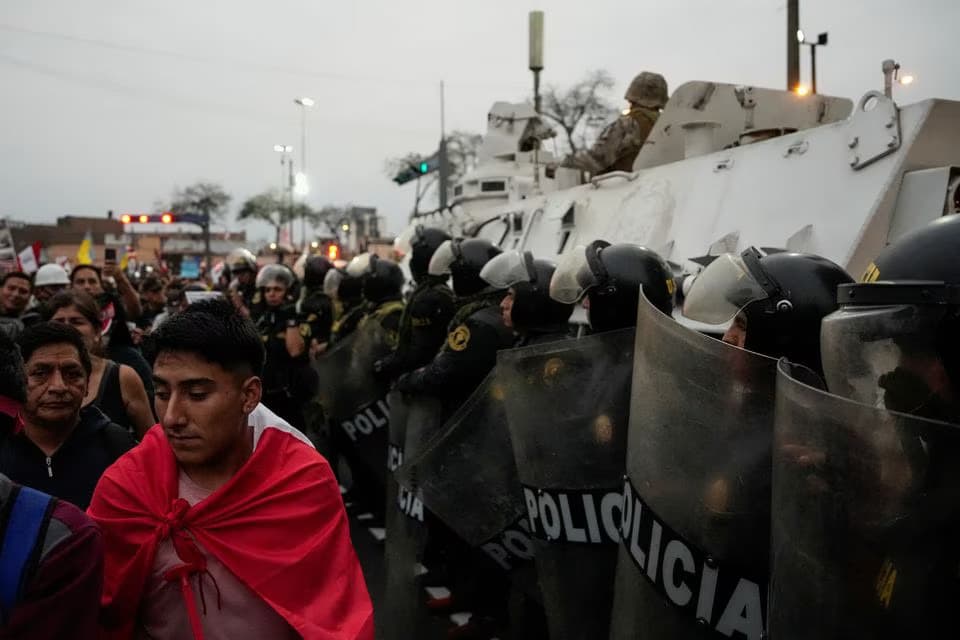Thousands of protesters rallied in Lima, Peru, on July 19, seven months since a parliamentary coup installed the regime of Dina Boluarte. These protests — referred to as the Third Taking of Lima — were accompanied by blockades throughout the country. Left Voice’s sister site in Peru reports that the protests expressed themselves with the slogan “Out with Dina the Killer,” and mobilizations and roadblocks took place in 32 percent of the country’s provinces. It is possible that a new process of struggle against the regime could open up in Peru.
This recent day of actions throughout the country was not at the level of intense resistance seen in December, January, and February, just after the ousting of President Pedro Castillo. While Castillo was unable to resolve the crisis of Peruvian capitalism and increasingly capitulated to the Right throughout his time as president, his anti-democratic ousting by a highly unpopular parliament sparked a deep questioning of Peru’s institutions of bourgeois democracy.
This crisis calls into question the legacy of the 1993 constitution established by the Fujimori dictatorship, which to this day maintains the rule of foreign capital over the country’s resources and uses the state’s institutions to keep in power only the Peruvian politicians who serve it. The coup also created outrage among the country’s majority peasant and Indigenous provinces who suffer racism from the politicians and capitalists and who live in severe poverty, even as their land is pillaged for foreign wealth.
Since February, the uprising has been largely in retreat. The state repressed the most extreme wave of class struggle with the police and military, especially in the rural Indigenous provinces, murdering about 70 people and injuring hundreds. The United States — whose leaders lecture the entire world about democracy and human rights — provides military aid to Boluarte and falsely claims her government is legitimate.
The repression alone, however, has not caused the ebb in class struggle. The trade unions and established organizations of the Left (largely represented by Stalinism and Maoism) have helped contain the struggle by not calling to unite the different sectors fighting the coup (workers, peasants, Indigenous people, students) and not organizing the intervention of the working class to use its strategic power and most powerful weapon, the strike. This misleadership expressed itself on July 19. As La Izquierda Diario Peru reports,
There was no organized participation of the working class from strategic sectors such as workers in large mines or workers in important services such as ports or urban transport in large cities, such as Lima for example. For this reason, it was not possible to materialize a real stoppage of economic activities, which was the main concern of the businessmen and the government, which is why during the days prior to July 19 they deployed an aggressive campaign to disqualify the struggle and to boycott it through the hardening of repressive measures.
Despite the misleadership of the established opposition, which limits the struggle, the regime remains incredibly weak. The protests were called at a time when Peru’s economy is showing symptoms of stagnation and a “technical recession.” A survey conducted by the Institute of Peruvian Studies revealed that 90 percent of Peruvians disapprove of parliament, and 80 percent disapprove of the coup president. But a separate poll conducted by IPSOS showed that 71 percent of the country’s businessmen support the regime, which has defended their interests by confronting the protests and oiling up the repressive police and military forces. Despite the backing of capital and the repressive police and military, the coup regime has no social base, a factor which makes it weak and opens a space for the struggle against the coup to develop.
In this context of a weak regime, a misleadership of the resistance to the coup, and signs of a spontaneous resistance which demonstrates a continued desire by the people of Peru to engage in struggle, Left Voice’s sister group in Peru, Corriente Socialista de las y los Trabajadores (CST), is calling for a political general strike. They assert that it is urgent to demand that all mobilized organizations call a great meeting of worker, peasant, Indigenous, and student organizations. Beyond some sectors of the resistance that stop at calling for a return to bourgeois democracy — which had been in crisis for years before the coup and offered little for the majority workers and peasants of the country — CST continues to call for a free and sovereign constituent assembly made up of the sectors engaged in class struggle against the regime, independent of the capitalists. This type of assembly is essential for the working class, poor, and oppressed majorities of Peru to develop their own way out of the crisis.











